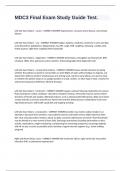MDC3 Final Exam Study Guide Test.
Left side heart failure - causes - CORRECT ANSWER hypertension, coronary artery disease, and valvular
disease
Left side heart failure - s/sx - CORRECT ANSWER fatigue, dyspnea, weakness, heaviness in arms and legs,
chest discomfort, palpitations, skipped beats, fast HR, cough, SOB, coughing, wheezing, crackles, pink
frothy sputum, night time coughing (when laying flat)
Left side heart failure - diagnostics - CORRECT ANSWER electrolytes, hemoglobin and hematocrit, BNP,
urinalysis, ABGs, ECG, pulmonary artery catheter, Echocardiography (best diagnostic tool)
Left side heart failure - nursing interventions - CORRECT ANSWER Assess activity tolerance by asking
whether the patient can perform normal ADLs or climb flights of stairs without fatigue or dyspnea, ask
about their ability to perform simultaneous arm and leg work, Ask how many pillows are used to sleep
or whether the patient sleeps in an upright position in a bed, recliner, or other type of chair, monitor for
and prevent potassium deficiency (diuretic therapy)
Left side heart failure - treatment - CORRECT ANSWER oxygen, preload reducing medications to remove
fluid and improve cardiac workload - (diuretics), Morphine (Avinza, MS Contin) may be used to relieve
shortness of breath and anxiety, Afterload reducers such as nitroprusside (Nitropress), dilate your blood
vessels and take a pressure load off your heart's left ventricle, Blood pressure medications if you have
high blood pressure, Self health- good diet and stopping smoking
Left side heart failure - pt education - CORRECT ANSWER provider may restrict sodium intake in an
attempt to decrease fluid retention, many patients need to omit table salt (no added salt) from their
diet, thus reducing sodium intake to about 3 g daily, excessive aldosterone secretion= their fluid intake
may be limited to a more normal 2 liters daily, Discharge instructions (including information on diet,
activity, medications, weight monitoring, and planning for worsening symptoms), Encourage patients
with HF to stay as active as possible and to develop a regular exercise regimen (e.g., home walking
program)
Right side heart failure cause - CORRECT ANSWER left ventricular failure, right ventricular myocardial
infarction (MI), or pulmonary hypertension
,Right side heart failure s/sx - CORRECT ANSWER peripheral edema in the lower legs and may progress to
the thighs and abdominal wall, weight gain, nausea, anorexia, ascites (Abdominal swelling caused by
accumulation of fluid), diuresis at rest, increased thirst, fatigue, JVD, nocturia (pressure builds up and
cannot drain out)
Right side heart failure diagnostics - CORRECT ANSWER electrolytes, hemoglobin and hematocrit, BNP,
urinalysis, ABGs, ECG, pulmonary artery catheter, Echocardiography (best diagnostic tool)
Right side heart failure nursing interventions - CORRECT ANSWER Ask about daily fluid intake, monitor
for and prevent potassium deficiency (diuretic therapy)
Right side heart failure treatment - CORRECT ANSWER oxygen, diuretics, daily weights, I & O
Right side heart failure pt education - CORRECT ANSWER education on nocturia and safety, provider may
restrict sodium intake in an attempt to decrease fluid retention, many patients need to omit table salt
(no added salt) from their diet, thus reducing sodium intake to about 3 g daily, excessive aldosterone
secretion= their fluid intake may be limited to a more normal 2 liters daily, Discharge instructions
(including information on diet, activity, medications, weight monitoring, and planning for worsening
symptoms), Encourage patients with HF to stay as active as possible and to develop a regular exercise
regimen (e.g., home walking program)
Beta Blocker/Digoxin Therapy - CORRECT ANSWER • Establish same time of day to take this medication
every day.
• Continue taking this medication unless your health care provider tells you to stop.
• Do not take digoxin at the same time as antacids or cathartics (laxatives).
• Take your pulse rate before taking each dose of digoxin. Notify your health care provider of a change
in pulse rate (60 to 100 beats/min is typically normal, depending on your baseline pulse rate) or rhythm
and increasing fatigue, muscle weakness, confusion, or loss of appetite (signs of digoxin toxicity).
• If you forget to take a dose, it may be delayed a few hours. However, if you do not remember it until
the next day, you should take only your usual daily dose.
• Report for scheduled laboratory tests (e.g., potassium and digoxin levels).
• If potassium supplements are prescribed, continue the dose until told to stop by your health care
provider.
, Mitral valve stenosis - causes - CORRECT ANSWER Rheumatic fever, results from rheumatic carditis
Valve replacement - pt education - CORRECT ANSWER patients receiving oral anticoagulants to stop
taking them before surgery, need to have a preoperative dental examination, incision care following
surgery and preventing infection, teach about respiratory complications, Drug therapy, including
diuretics, vasodilators, beta blockers, calcium channel blockers, antibiotics, and anticoagulants, use of
antibiotics
Valve replacement - post op care - CORRECT ANSWER monitor CO and assess for indications of heart
failure, report any indications of HF to the surgeon immediately, if heart rate or blood pressure
decreases, call the Rapid Response Team, monitor respiratory status closely during weaning from the
ventilator, be especially alert for bleeding, ensure that the home environment can provide rest while
moving the patient toward increased activity levels
Mitral regurgitation - causes - CORRECT ANSWER mitral valve prolapse and rheumatic heart disease
(Other causes include infective endocarditis, papillary muscle dysfunction, or rupture resulting from
ischemic heart disease or congenital anomalies)
Mitral regurgitation - s/sx - CORRECT ANSWER fatigue, dyspnea on exertion, orthopnea, palpitations,
atrial fibrillation, neck vein distention, pitting edema, high-pitched holosystolic murmur
Mitral regurgitation - complications - CORRECT ANSWER A-fib, heart failure, high BP in lungs, mitral
valve prolapse
Mitral valve prolapse - s/s - CORRECT ANSWER atypical chest pain, dizziness, syncope, palpitations, atrial
tachycardia, ventricular tachycardia, systolic click
Aortic regurgitation - s/s - CORRECT ANSWER palpitations, dyspnea, orthopnea, paroxysmal nocturnal
dyspnea, fatigue, angina, sinus tachycardia, blowing, decrescendo diastolic murmur
Infective Endocarditis - causes - CORRECT ANSWER -occurs primarily in patients who abuse IV drugs,
have had valve replacements, have experienced systemic alterations in IMMUNITY, or have structural
cardiac defects




